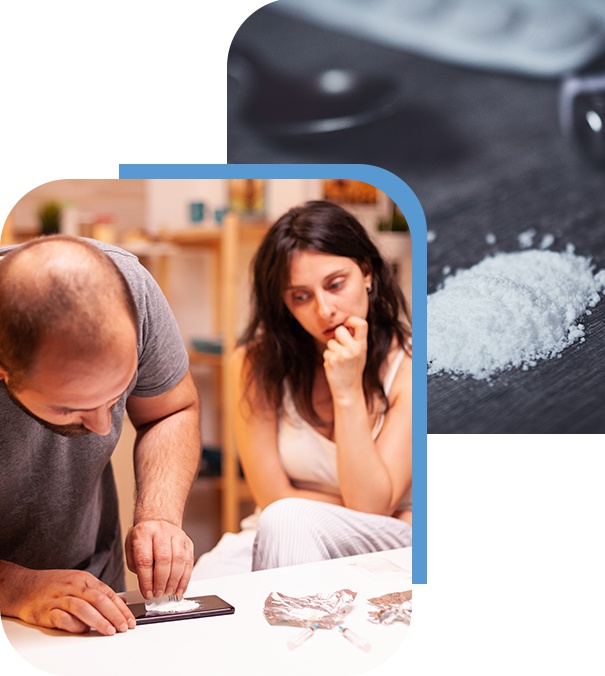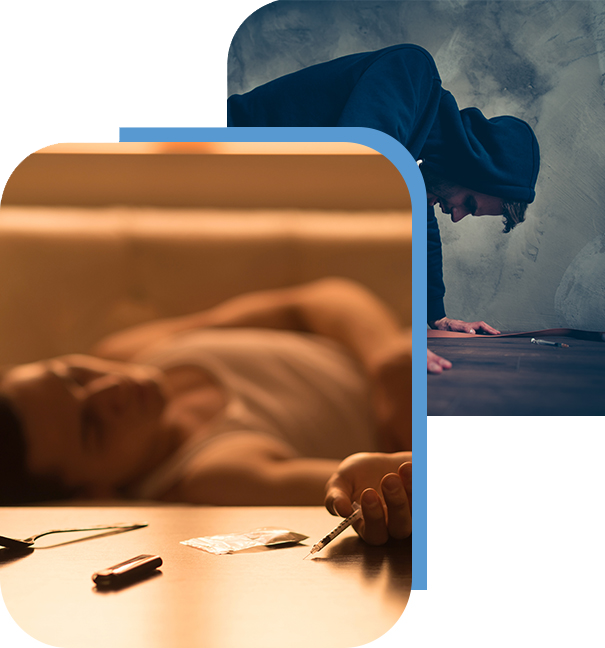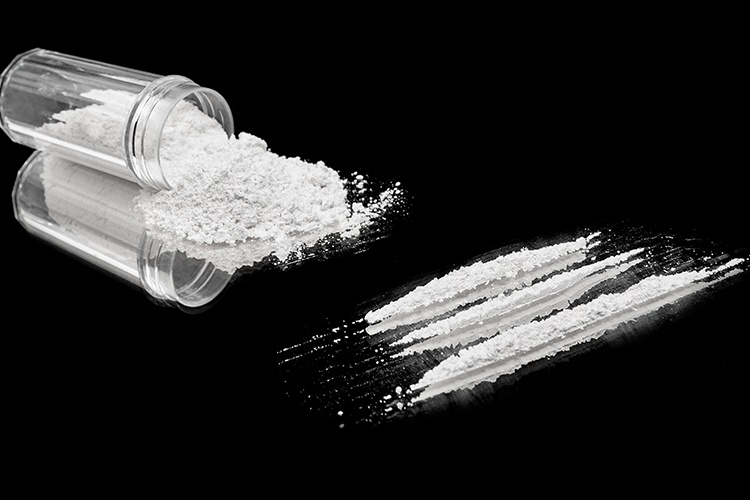Are you or a loved one seeking cocaine addiction treatment? Are you struggling with withdrawal and need cocaine detox and/or cocaine rehab?
1000 Islands Addiction Treatment Centre proudly specializes in both medically-supervised detoxification and cocaine addiction treatment services at our beautiful cottage style centre located on the St. Lawrence River, in Mallorytown, ON.
How can we help you?
Cocaine Rehab Centre in Ontario
Cocaine is a powerful stimulant that works by producing a surge of dopamine – the chemical produced by the brain that makes us feel good. Like most artificially induced dopamine spikes, the ones produced by cocaine are problematic for two main reasons: first, when the dopamine level falls, it does not drop at a natural rate – it plummets rapidly, resulting in feelings of extreme anxiety, agitation and depression. And second, in order to achieve the same effect next time round, the user has to take a higher dose of the drug.
In its natural form, cocaine is derived from the leaves of the coca plant, which is indigenous to South America. Over the years, it has had various uses as a painkiller and a stimulant.
Much of the cocaine in circulation today is synthetically produced in laboratories that, because they are illegal, do not follow any health and safety standards. In addition, unscrupulous producers frequently combine the cocaine with other, less expensive substances. Many of these substances are considered toxic to humans.
CALL OUR TOLL FREE HELP LINE NOW 1-855-929-4045 or SEND US A MESSAGE
How Does Cocaine Addiction Affect The Body And Mind?
The effects of cocaine vary depending on several factors, such as the user’s age and state of physical and mental health, whether the cocaine is “pure” or blended with other substances, and whether it is being used in conjunction with alcohol, Marijuana or other drugs.
The method of ingestion has an impact as well: cocaine can be taken in several ways, including sniffing or snorting, smoking, injecting, or orally in the form of tablets.
Short Term Effects of Cocaine Addiction
The most immediate effect of cocaine – and the reason people use it – is a surge of energy and alertness. This may be accompanied by feelings of intense happiness and social confidence: people who are naturally shy may suddenly become outgoing and talkative.
Because the body is on high alert, the user may become ultra-sensitive to light, sound and touch. If they are at a party, they may want to stay longer, but they will dim the lights and try to turn the music down.
The highly alert feeling that comes with cocaine use sometimes goes hand-in-hand with paranoia. The happiness that the user experiences can be tempered with distrust and anxiety. This can lead to problematic behaviour, such as belligerence and aggressiveness.


Long Term Effects of Cocaine Addiction
People who have been using cocaine regularly for any length of time may start to experience longer term effects, including the following:
- Headaches
- Frequent and erratic mood swings
- Increased risk of stroke, heart disease and lung disease
- Convulsions and seizures
- Users who inject cocaine are at increased risk of HIV and hepatitis if they use shared needles
- Users who inhale cocaine may lose their sense of smell and experience nosebleeds
- Users who take cocaine orally may experience bowel discomfort
Risk Of Cocaine Overdose
Because cocaine can be, and frequently is, combined with other substances without the user’s knowledge, the risk of fatal overdose is high. The fact that the exact composition may be unknown can make it difficult for first responders and medical practitioners to administer the right treatment.
What makes cocaine overdoses so dangerous is that they often lead to cardiac arrest or stroke, which can be fatal or leave behind permanent damage.
Signs of cocaine overdose include chest pain, nausea or vomiting, an increased heart rate, and elevated body temperature. If a cocaine user is exhibiting these signs, it is important to get them medical help as soon as possible.
Why Do I Need Rehab?
Statistics overwhelmingly show that those who try to overcome cocaine addictions alone have very low odds of succeeding. The withdrawal symptoms can be intensely uncomfortable, and in some cases, dangerous, and instead of putting themselves through that, many addicts will just go back to using the drugs.
Surviving Detox
These withdrawal symptoms include tremors, anxiety, extreme fatigue, pain in the muscles and nerves, and trouble concentrating or thinking coherently. In severe cases, the addict may have suicidal thoughts and engage in self-harm.
At 1000 Islands, the first step in cocaine addiction treatment is medical detox, where you are supervised by doctors as the last of the cocaine is working its way out of your system. This allows us to keep you as comfortable as possible, treat withdrawal symptoms as they arise, and keep you safe through the whole process.
Rehab: A New Start To A New Life
When detox is complete, you will be ready to move onto the rehab phase of your cocaine addiction treatment. Your treatment program is custom-made for you, with consideration for your unique needs and circumstances, your physical and mental health, the duration and severity of the addiction, your lived experiences, and your social, cultural and spiritual needs.
We use a variety of treatment modalities, including group and individual therapy, creative activities such as art and music, and a variety of educational workshops.


Aftercare for Cocaine Addiction Treatment
When it is time for you to leave our facility, our support for you and your loved ones will remain. We understand the challenges of transitioning from inpatient cocaine drug rehab back into the real world, and we will be there by your side. Our aftercare program includes access to emergency support lines, follow-up sessions to monitor your progress, and ongoing educational sessions. We will also help you find support groups, therapists, and other professionals in your area.
Cocaine Treatment Types
Inpatient Treatment
Also known as residential treatment, cocaine addiction rehab involves staying at a rehab facility for an extended period, typically 42 days or longer. There, you may participate in therapy and counselling to support you in overcoming cocaine addiction and achieving long term recovery. There are many benefits to staying at a residential treatment program, including finding the time, privacy and seclusion to focus on your health, and connecting with peers in recovery.
Outpatient Treatment
There is no one-size-fits-all approach to successful recovery from cocaine use disorder. Sometimes a full-time program is not a preferred option, which is when outpatient treatment may be beneficial.
Outpatient cocaine rehab allows you to connect with counsellors while maintaining your regular responsibilities, because it does not involve an extended stay away from your routine. With more freedom you also have to be very disciplined in quitting cocaine, as you won’t have the same level of ongoing support as you would in inpatient rehab programs.
Group Therapy
Group counselling is a regular aspect of addiction treatment programs, and a common example is Narcotics Anonymous. Group counselling led by an addiction counsellor creates space for peers to speak through their issues with drug use, the physical effects and other toxic effects it has had on their lives. Sharing experiencing and support for others in recovery is conducive to overcoming long term cocaine use.
Individual Counselling
While in cocaine addiction treatment, individual sessions with an addictions counsellor provides a valuable opportunity to discuss behavioral interventions for relapse prevention. Behavioural therapies like contingency management are key parts of a holistic approach to overcome addiction from cocaine and other drugs during cocaine rehab.
How Do I Get Started with Cocaine Addiction Rehab
Your journey to a better life can start right now. All you have to do is give us a call to make an appointment for an assessment. Whether you live around the corner or on the other side of the continent, we are here to help. Our Addiction Rehab is located in a beautiful setting on Lake Ontario, and we provide a safe, caring environment that is conducive to healing.
If you are concerned about a loved one who is showing signs of cocaine addiction, call us and ask about our intervention services. We are a cocaine addiction rehab centre that does not believe in bully tactics: our interventions are designed to gently guide your loved one to a decision to help themselves.

Frequently Asked Questions
What is cocaine addiction and how is it treated in Toronto?
Cocaine addiction or substance use disorder is the consistent desire for and use of cocaine despite negative/harmful consequences in your life. Just as with other addictive substances, you should seek treatment options that include mental health services and interventions like cognitive behavioral therapy. These kinds of treatment programs offer holistic cocaine addiction help, giving you new tools with contingency management, understanding human mood swings and triggers, and addressing any concurrent mental health disorders.
What are the different types of treatment available for cocaine addiction in Toronto?
There are a few different options to receive treatment for cocaine addiction. Inpatient treatment involves staying at addiction treatment centres for an extended period.
Outpatient addiction treatment still involves many of the same treatment interventions, however you still maintain your regular responsibilities. This can be either beneficial or harmful, it depends on the individual’s circumstances. Outpatient treatment is offered virtually within our care network.
What is the process of detoxification in cocaine addiction treatment?
When you enter cocaine detox at our facility, we utilize medication assisted therapy and supervise your progress to ensure you are comfortable and safe as the effects of the drug leave your system. Once you’ve successfully overcome withdrawal safely, you can transition to a full-time treatment program.
What are the signs that someone might need cocaine addiction treatment?
If someone continues to use cocaine despite having a negative impact on their lives, and/or if they have tried to stop using multiple times without success, medical treatment for addiction may be necessary.

